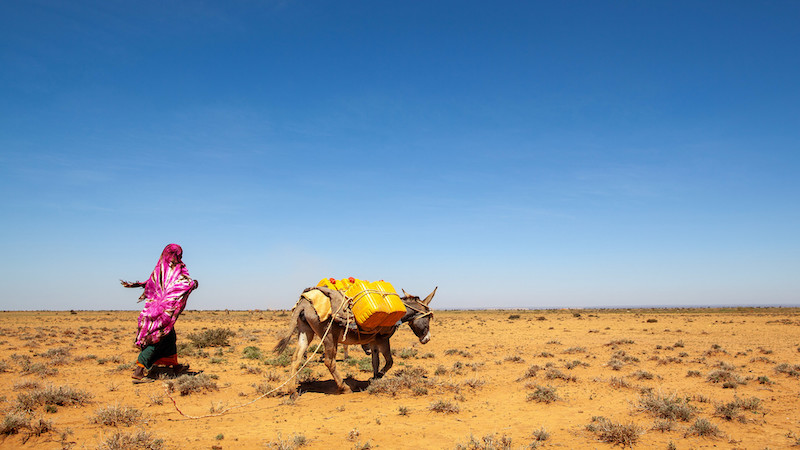A United Nations fundraiser for aid operations in the drought-stricken Horn of Africa has fallen short as donor countries pledged only a third of the $7 billion sought.
The UN warned against a “catastrophe” in Ethiopia, Kenya and Somalia, which it described as the epicentre of the world’s worst climate emergencies.
Donor countries have pledged a total of $2.4 billion for 2023, but only $0.8 billion in new financial support was announced at this week’s event. The US will provide nearly two-thirds of the money, followed at some distance by the European Commission, Germany and the UK.
The money raised at a pledging conference this week will help humanitarian agencies provide food, water, healthcare and protection services to over 30 million people across the three countries.
Tinebeb Berhane, country director for ActionAid in Ethiopia, told Climate Home News she was “extremely disappointed” and “saddened” with the outcome. “The pledges do not even touch the surface of the level of support needed on the ground”, she added.
Oxfam has called the commitments “dismally inadequate”.
The shortcomings of UN pledging events like this one will put the spotlight on the implementation of the landmark loss and damage deal struck at Cop27. Governments agreed to create a fund for vulnerable communities hit by climate impacts.
Climate-induced drought
The Horn of Africa has been suffering its worst drought in 40 years since October 2020. Five consecutive seasons of rainfall below normal levels have led to crops failing and farm animals dying.
A group of scientists estimated that human-driven climate change has made these events “much stronger” and “about 100 times more likely”.
World Bank body delays vote on controversial loan to Brazilian dairy firm
The World Weather Attribution group said the drought was made much more severe because of the low rainfall and increased evaporation caused by higher temperatures in the world.
Kenya, Somalia and Ethiopia combined now contribute less than 0.5% of the greenhouse gas emissions that cause climate change despite having 2.5% of the world’s population.
“People in the Horn of Africa are paying an unconscionable price for a climate crisis they did nothing to cause,” UN chief Antonio Guterres told the pledging event in New York.
The crisis has been made worse by conflicts and rising global commodity prices as a result of the war in Ukraine. More than 32 million people are facing acute food insecurity and 2.7 million people have been displaced.
The United States made the top pledge – an additional $524 million on previous announcements, taking its total for 2023 to some $1.4 billion. The European Commission committed $185 million, Germany $163 million, Britain $120 million and the Netherlands $92 million.
“This is a global problem that requires all of us,” U.S. Ambassador to the United Nations Linda Thomas-Greenfield told the event.
‘Moral failure’
Andrew Mitchell, the UK minister for development, said “the clear and present threat remains, and we must act now to prevent further suffering”. But aid groups have criticised the pledge made by the UK, branding it a “moral failure”.
A group of organisations led by the International Rescue Committee has called on donors “to take immediate steps to break the cycle of short-term, inadequate funding” in the Horn of Africa.
ActionAid’s Berhane hopes the limited funding promised will be delivered swiftly. “Time is a big factor for these life-saving humanitarian interventions,” she said.
The Eastern African drought is only one of the many climate-induced crises in which financial aid has been slow-moving.
Echoes of Pakistan
Devastating floods struck Pakistan last year, causing $10 billion in estimated damage. After a UN appeal, wealthy countries pledged a sum roughly sixty times smaller in support. But even those funds were slow to arrive.
Subsequently, at a pledging event last January, a group of 40 countries, multilateral banks and private donors committed more than $8.5 billion towards Pakistan’s recovery.
But Pakistan’s climate minister Sherry Rehman said yesterday that “pledges made at international conferences solely for Pakistan have still not been realised”.
“UN flash appeals are no longer capitalised as they used to be,” she said, as “at least half of the UN flash appeals go unfunded”. She called for the loss and damage fund to be set up as soon as possible.
